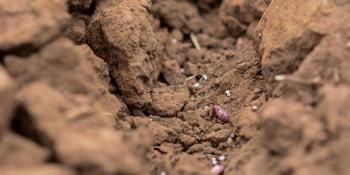CSA Investment Advantage: Identifying best-bets
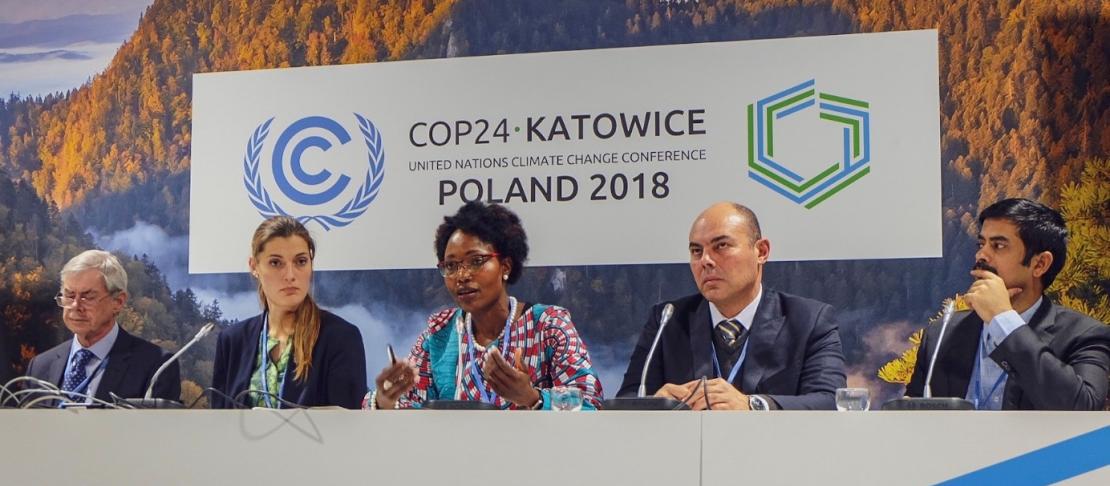
At the CSA Investment Advantage event, part of the larger Agriculture Advantage 2.0 event series at COP24, participants discussed ways to identify best-bet CSA technologies and practices for investment.
The transformation needed in the agriculture sector to address climate change requires the identification of climate-smart, context specific and investment-ready opportunities for farmers, investors and policy makers. Though promising climate-smart agriculture (CSA) practices exist and much has been learnt in recent years that can support decision-making, many decision-makers still struggle identifying the best-bet CSA interventions in their own context.
Addressing this gap, speakers and participants at the CSA Investment Advantage event, part of the Agriculture Advantage 2.0 event series at COP24, discussed practical and cutting-edge techniques for prioritizing CSA practices and technologies for investment. Case studies from three countries were discussed, and a new report launched at the event by the World Bank, International Center for Tropical Agriculture (CIAT), and CGIAR Research Program on Climate Change, Agriculture and Food Security (CCAFS) provided a useful synthesis of information on best-bet CSA practices and technologies gathered from the CSA profiles of 33 countries.
A new synthesis of best-bet CSA technologies and practices
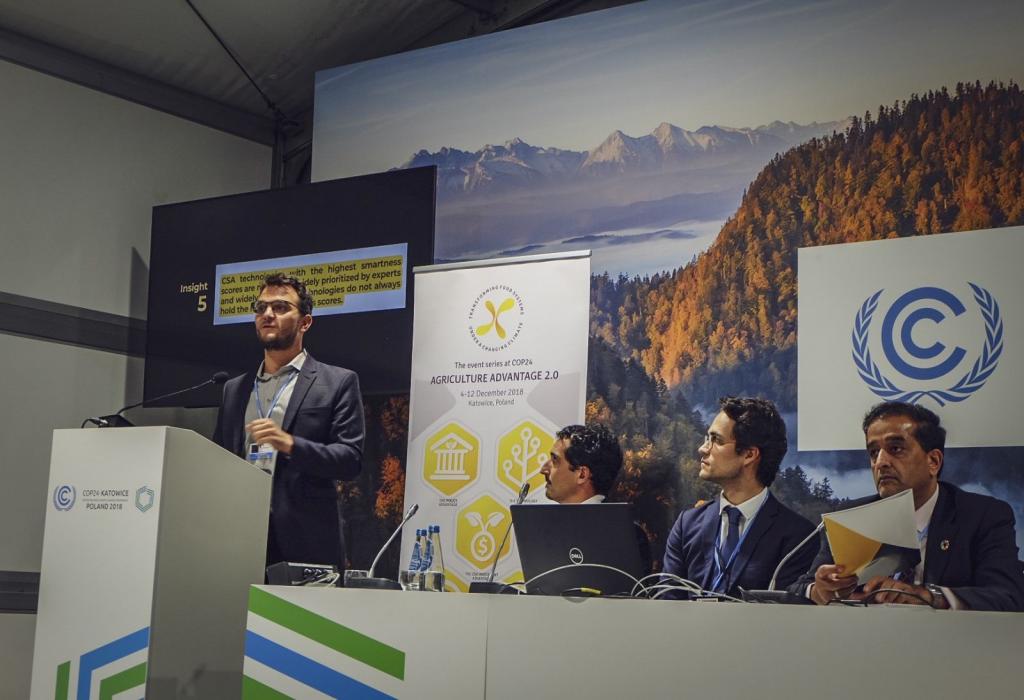
Tobias Baedeker introduces the newly launched report highlighting its main findings. Photo: Ratih Septivita (CCAFS)
Tobias Baedeker (World Bank) and Godefroy Grosjean (Asia Climate Policy Hub, CIAT) introduced the report, highlighting major findings and emphasizing that now is the time to move towards implementation. Accordingly, the report aims to serve as a basis for scaling up successful CSA technologies and practices that score highly in all three categories assessed: productivity, mitigation and adaptation. In addition to the scores, the report contains information about national agricultural contexts, modelled projections, and an analysis of the enabling environment.
Successful CSA technologies appear to coincide with common sense agriculture. And this makes sense as farmers will only implement what saves money, water or time. So most of the CSA technologies also have an economic case.”
Tobias Baedeker, Agricultural Economist, World Bank
The synthesis found that some of the most successful CSA technologies concern water management. Giriraj Amarnath, Research Group Leader at the International Water Management Institute (IWMI), further developed the case of CSA technologies for water management, which can improve water harvesting, retention in soils, and efficiency of irrigation.
Experiences from Pakistan, Zambia and Morocco
Our agricultural system is very vulnerable to climate change, so CSA is a topic close to our hearts in Pakistan. What is important for us now is moving from reports to action on the ground. The number of policies made versus the number implemented is striking”
– Malik Amin Aslam, Advisor to the Prime Minister on Climate Change, Ministry of Climate Change, Government of Pakistan
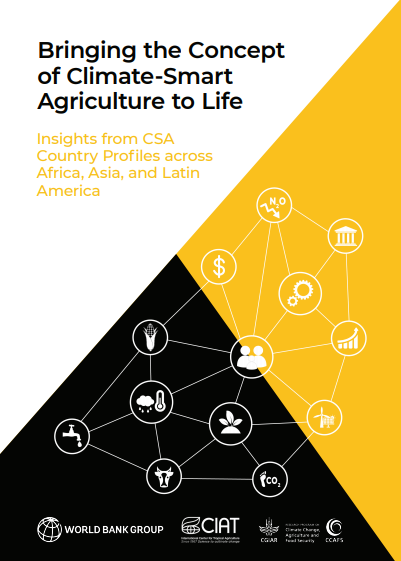 Download the report: Download the report:Bringing the Concept of Climate-Smart Agriculture to Life |
Malik Amin Aslam (Pakistan Ministry of Climate Change) emphasized that reports and policy plans for investment opportunities alone will not have much impact on the ground. However, many actors still prioritize developing reports, and often policies that were carefully drafted are not implemented in the end. Moreover, as different contexts call for different CSA approaches, it is crucial to discuss on-the-ground experience when planning to invest in CSA.
Tasila Banda (Zambia Ministry of National Development Planning) provided lessons from a newly launched project in cooperation with the World Bank that builds on Zambia's CSA profile. One major challenge in Zambia is the access to equipment to conduct site-specific soil analysis and inform farmers in a timely manner about changes in irrigation ex-ante. To address this and other gaps, the project trains CSA practitioners and investors to help them develop CSA investment plans to operationalize the country's commitments over both the short- and long-term.
Riad Balaghi, Head of Department, National Institute for Agronomic Research, Morocco, explained Morocco's experience through the case of Morocco's participation in the Africa Agriculture Initiative launched by parties during COP22 in Marrakech, which connected UNFCC activities with initiatives on the ground. The initiative gives countries practical advice on incorporating agriculture into national climate action plans for mitigation and adaptation. Having successfully triggered the development of projects in Morocco and Guatemala, the initiative is now looking to expand successful actions to other countries.
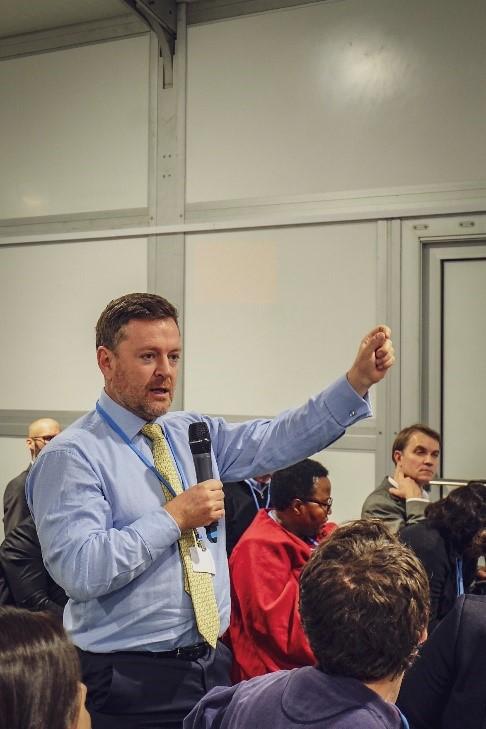
Mathew Reddy (World Business Council for Sustainable Development) asks the panellists to elaborate on the role of business in their respective projects. Photo: Ratih Septivita (CCAFS)
Moving from plans to action
All of the speakers agreed: now is the time for action. But how can we move from reports to implementation of CSA investment plans? This requires the formation of an enabling environment for decision-makers, and the development of investment-ready approaches for implementing climate-smart agriculture.
Some organizations are already taking action. The Food and Agriculture Organization of the UN (FAO) and International Fund for Agricultural Development (IFAD) are two examples. Based on evidence that CSA practices successfully address multiple goals—building farmers' resilience to climate change and improving local livelihoods, for instance—FAO is supporting countries to enhance their financial mechanisms and investment plans for CSA, explained Liva Kaugure, Natural Resources Officer. David Radcliffe, a consultant on IFAD's Adaptation for Smallholder Agriculture Programme (ASAP) from the UK Department of International Development (DFID) elaborated on the IFAD ASAP approach, which promotes CSA through large investments in a range of countries, and integrates gender and youth considerations.
By making it easier to prioritize CSA technologies and practices for investment, we can continue to encourage the operationalization of investment plans needed so urgently to address climate change and food security.
Couldn't attend the event? You can watch the web recording here (click "Join the event" to watch).
More news updates from the Agriculture Advantage 2.0 event series:
|
|---|
Read more:
- Presentation from the event: CSA Investment Advantage: Synthesis Paper Presentation by World Bank
- CIAT, CCAFS & World Bank report launched at the event: Bringing the concept of climate-smart agriculture to life
- CCAFS Profiles: CSA country profiles
- IWMI/WLE project brief: Developing pathways to climate resilience through the sustainable management of water, land and ecosystems
- IWMI/WLE research report: Business model scenarios and suitability: Smallholder solar pump-based irrigation in Ethiopia
- CCAFS briefing: A 6-part action plan to transform food systems under climate change, available in 2 formats: Exposure story with animated graphics | downloadable Info Note
- CCAFS working paper: Climate change mitigation and food loss and waste reduction: Exploring the business case
- CCAFS report: Measure the chain: tools for assessing GHG emissions in agricultural supply chains
- CCAFS webpage: Invest in climate change and agriculture
Luja von Köckritz is a Research and Communications Student Assistant for CCAFS. Marissa Van Epp is the Global Communications and Knowledge Manager for CCAFS.



